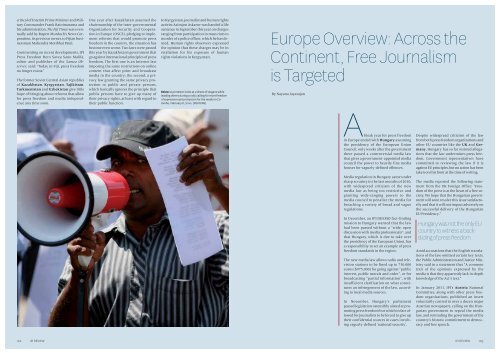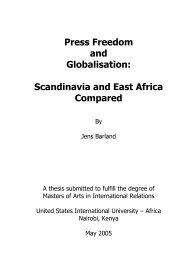FOCUS ON THE AMERICAS - International Press Institute
FOCUS ON THE AMERICAS - International Press Institute
FOCUS ON THE AMERICAS - International Press Institute
Create successful ePaper yourself
Turn your PDF publications into a flip-book with our unique Google optimized e-Paper software.
critical of Interim Prime Minister and Military<br />
Commander Frank Bainimarama and<br />
his administration. The Fiji Times was eventually<br />
sold by Rupert Murdoch’s News Corporation,<br />
its previous owner, to Fijian businessman<br />
Mahendra Motibhai Patel.<br />
Commenting on recent developments, IPI<br />
<strong>Press</strong> Freedom Hero Savea Sano Malifa,<br />
editor and publisher of the Samoa Observer,<br />
said: “Today in Fiji, press freedom<br />
no longer exists.”<br />
The former Soviet Central Asian republics<br />
of Kazakhstan, Kyrgyzstan, Tajikistan,<br />
Turkmenistan and Uzbekistan give little<br />
hope of bringing about reforms that allow<br />
for press freedom and media independence<br />
any time soon.<br />
One year after Kazakhstan assumed the<br />
chairmanship of the inter-governmental<br />
Organization for Security and Cooperation<br />
in Europe (OSCE), pledging to implement<br />
reforms that would promote press<br />
freedom in the country, the situation has<br />
become even worse. Two laws were passed<br />
this year by Kazakhstan’s government that<br />
go against international principles of press<br />
freedom. The first one is an Internet law<br />
imposing the same restrictions on online<br />
content that affect print and broadcast<br />
media in the country; the second, a privacy<br />
law granting the same privacy protection<br />
to public and private persons,<br />
which basically ignores the principle that<br />
public persons have to give up many of<br />
their privacy rights, at least with regard to<br />
their public function.<br />
In Kyrgyzstan, journalist and human rights<br />
activist Azimjon Askarov was handed a life<br />
sentence in September this year on charges<br />
ranging from participation in mass riots to<br />
murder of a police officer, which he has denied.<br />
Human rights observers expressed<br />
the opinion that these charges may be in<br />
retaliation for his exposure of human<br />
rights violations in Kyrgyzstan.<br />
Below: A protester looks at a sheet of slogans while<br />
leading others during a rally calling for more freedom<br />
of expression and protection for the media in Colombo,<br />
February 8, 2010. (REUTERS)<br />
Europe Overview: Across the<br />
Continent, Free Journalism<br />
is Targeted<br />
By Nayana Jayarajan<br />
Ableak year for press freedom<br />
in Europe ended with Hungary assuming<br />
the presidency of the European Union<br />
Council, only weeks after the government<br />
there passed a controversial media law<br />
that gives a government-appointed media<br />
council the power to heavily fine media<br />
houses for vaguely-defined offences.<br />
Media regulation in Hungary came under<br />
sharp scrutiny in the last months of 2010,<br />
with widespread criticism of the new<br />
media law as being too restrictive and<br />
granting wide-ranging powers to the<br />
media council to penalize the media for<br />
breaching a variety of broad and vague<br />
regulations.<br />
In December, an IPI/SEEMO fact-finding<br />
mission to Hungary warned that the law<br />
had been passed without a "wide, open<br />
discussion with media professionals", and<br />
that Hungary, which is due to take over<br />
the presidency of the European Union, has<br />
a responsibility to set an example of press<br />
freedom standards in the region.<br />
The new media law allows radio and television<br />
stations to be fined up to 730,000<br />
euros ($975,000) for going against "public<br />
interest, public morals and order", or for<br />
broadcasting "partial information", with<br />
insufficient clarification on what constitutes<br />
an infringement of the law, according<br />
to local media sources.<br />
In November, Hungary's parliament<br />
passed legislation ostensibly aimed at promoting<br />
press freedom but which in fact allowed<br />
for journalists to be forced to give up<br />
their confidential sources in cases involving<br />
vaguely-defined 'national security'.<br />
Despite widespread criticism of the law<br />
from both press freedom organizations and<br />
other EU countries like the UK and Germany,<br />
Hungary has so far resisted allegations<br />
that the law undermines press freedom.<br />
Government representatives have<br />
committed to reviewing the law if it is<br />
against EU principles, but no action has been<br />
taken on this front at the time of writing.<br />
The media reported the following statement<br />
from the UK Foreign Office: "Freedom<br />
of the press is at the heart of a free society.<br />
We hope that the Hungarian government<br />
will soon resolve this issue satisfactorily<br />
and that it will not impact adversely on<br />
the successful delivery of the Hungarian<br />
EU Presidency."<br />
Hungary was not the only EU<br />
country to witness a backsliding<br />
of press freedom.<br />
Amid accusations that the English translations<br />
of the law omitted certain key texts,<br />
the Public Administration and Justice Ministry<br />
said in a statement that "A common<br />
trait of the opinions expressed by the<br />
media is that they apparently lack in-depth<br />
knowledge of the Act's text."<br />
In January 2011, IPI’s Austria National<br />
Committee, along with other press freedom<br />
organizations, published an insert<br />
voluntarily carried in over a dozen major<br />
Austrian newspapers, calling on the Hungarian<br />
government to repeal the media<br />
law, and reminding the government of the<br />
country’s historic commitment to democracy<br />
and free speech.<br />
102 IPI REVIEW<br />
IPI REVIEW 103

















